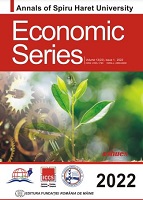Youth Economic Empowerment and Poverty Reduction in West Africa (Reference to the Amnesty International Programme in the Niger Delta)
Youth Economic Empowerment and Poverty Reduction in West Africa (Reference to the Amnesty International Programme in the Niger Delta)
Author(s): Ayo Olatunbosun Falana, Ademola Olalekan Adedun, Adeolu Oluwole FamiloyeSubject(s): Regional Geography, Developing nations, Demography and human biology, Economic development, Human Resources in Economy
Published by: Editura Fundaţiei România de Mâine
Keywords: youth economic empowerment; poverty reduction; West Africa; Niger Delta;
Summary/Abstract: The growth of an economy needs to have a great impact on the citizens of that economy and thus help reduce poverty which is one of the main purposes of the millennium development goals. Nigeria has one of the largest populations in Africa and regarded as wealthy in terms of natural resources but with high levels of poverty. The government in their effort applied many policies in eradicating poverty through many empowerment programmes. This study attempts to examine if the em powerment programmes implemented by the government really helped in reducing poverty with focus on the youth who are the future of the economy. Focus was laid on the Amnesty Programme implemented to empower the youth in the Niger-Delta, highlighting the financial commitment of the programme and challenges encountered. The study uses the qualitative research approach which was exploratory and descriptive in nature with information leading to deduction of conclusions derived from journals, books and previous papers. It was realized that the Amnesty programme has helped to prevent the militant youths from their bad deeds and succeeded in equipping them with technical training in various fields of endevour. It was also concluded that there has been a lavish expenditure on the programme but still encounter many challenges such as unpaid or irregular payment of allowances to beneficiaries, inappropriate training provision, and limited employment prospects and so on. The challenges hinder the achievement of the expected goals and thus do not yield any effective result in reducing poverty. The study recommends that The Federal government should provide funds to the beneficiaries of the programme to establish their own businesses or provide them with job opportunities since unemployment of the graduates can push them back to the creek.
Journal: Annals of Spiru Haret University. Economic Series
- Issue Year: 22/2022
- Issue No: 1
- Page Range: 227-241
- Page Count: 15
- Language: English

